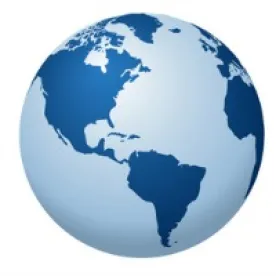As the new year begins, numerous Latin American issues have moved to the center stage, including Venezuela, Argentina, Mexico, and Cuba. To gain some insights into what lies ahead for our southern neighbors, Global Policy Watch (GPW) spoke with Dr. Arturo Valenzuela, former Assistant Secretary of State for Western Hemisphere Affairs.
GPW: Dr. Valenzuela, what do you see as the most significant factors which will influence developments in Latin America in 2015?
Dr. Valenzuela: At this point, both the political and economic situations in the Latin American countries are driven by two primary factors. The first is the decline in the rate of growth in China which has affected commodity and other exports to China. These include minerals as well as soybeans and other items. The second major factor is the significant decline in oil prices. This decline is having a huge impact throughout Latin America and is affecting the prospects of growth in many countries.
GPW: Which countries will be particularly affected by the drop in oil prices?
Dr. Valenzuela: The biggest adverse impact will be felt by Venezuela and Ecuador because those countries are significant oil producers. Venezuela is being hit particularly hard because that country does not have a strong manufacturing base and must import most of the products it consumes. This has led to high inflation, currently running at 60-65%.
Argentina will also be adversely affected by the decline in oil prices because Argentina had the prospect of foreign investment to assist in developing its shale gas and potentially a large new oil field. It was hoped that this increased investment would help jump start the Argentine economy. However, 2015 is likely to see a decline in investment. At the same time, Argentina is also suffering from a reduction in its foreign exports of soybeans.
GPW: Which countries in Latin America will benefit from the plunge in oil prices?
Dr. Valenzuela: Those which depend upon oil imports. As the price of oil has declined, it makes their manufacturing exports more attractive in price. Among these countries are Chile and Mexico. Chile, because it is an oil importer. This benefit for Chile is particularly important in the short term because that country’s exports of copper to China have declined.
Though Mexico is a significant oil producer, that country will be less affected by the decline in the price of oil because it has a broad manufacturing base and the cost of its raw materials will be reduced.
GPW: Dr. Valenzuela, in other contexts, you have spoken about a trend about toward two blocs of South American countries, an Atlantic and a Pacific bloc. Could you please amplify this development?
Dr. Valenzuela: The countries in the Atlantic, which include, Brazil, Argentina, Uruguay, Paraguay, and Venezuela, have made an effort at economic integration with the formation of their Mercosur group. These countries have formed what essentially is a customs union in an effort to maintain a high level of protectionism. Their efforts at integration, while loose, have not been very successful.
In contrast, the countries in the Pacific, which include Chile, Peru, Mexico, and Colombia have focused on reducing tariffs and have entered into significant free trade agreements with a number of other countries throughout the world. This approach has led to expanding economies in these Pacific countries, in contrast to declining growth for the Mercosur countries.
GPW: Venezuela seems to be in a tailspin with its economic problems. Do you think the leadership can turn the country around?
Dr. Valenzuela: Venezuela faces the most critical economic situation in all of Latin America. Not only have oil prices declined, but its production has declined as well. These factors have produced considerable disinvestment in the country. Venezuela’s economy depends upon oil at approximately $80 per barrel, and current prices are well below that. Moreover, Venezuela has engaged at petro diplomacy by selling inexpensive oil to Cuba and other Caribbean countries.
Venezuela entered into large loan agreements with China by which Venezuela exported oil to China in return for these loans. It is now likely that Venezuela might default on these loans and the question becomes whether the Chinese would bail out Venezuela. This country’s economic situation is particularly difficult because it essentially imports almost all the materials and products which it needs, and with the decline in currency these imports have gotten much more expensive.
GPW: We have been hearing for some time that Argentina will improve its economic and political fortunes. Do you believe that 2015 will be the year that Argentina will move closer to achieving its potential?
Dr. Valenzuela: The drop in oil prices and exports have led to inflationary pressures within the country. Currently there is low economic growth in Argentina and there is a shortage of dollars for imports. These factors make the current economic situation difficult. On the other hand, there is the prospect for political change because a presidential election will take place in 2015 and President Kirchner cannot run for reelection. Some in Argentina believe that the current president and administration are not doing enough to turn around the economic situation. The country may move in a different direction in this election, and that means there is the prospect for improvement.
GPW: Chile has been an outstanding economic performer in recent years. Do you think that this will continue?
Dr. Valenzuela: Chile benefits from very responsible macroeconomic policies which have permitted the country to increase its reserves. It has also benefited from a sound political system characterized by the rule of law.
2015 will pose a challenge for Chile because it is a huge copper producer and the price of copper has declined considerably as have Chile’s exports to China, which was a major customer for that country. On the other hand, Chile has considerable exports in other sectors such as agriculture and wines. Those other exports, along with the country’s economic policies, should continue to produce growth in the coming year, although the growth rate this year should be less than it was last year.
GPW: Dr. Valenzuela, you have been quoted extensively in the media about President Obama’s new Cuban policy. How quickly do you see Cuba becoming a market for American companies?
Dr. Valenzuela: I believe that it will take some time before there is full scale American investment. The changes rolled out by the Obama Administration in terms of travel and investment have been modest. Large scale significant economic change will require Congressional action to modify existing laws. Over the long haul, I believe there will be more investment by U.S. companies in Cuba. However, I do not expect this to occur in the short term.
There will also be a focus by the American government on the human rights situation in Cuba. The hope is that this situation can improve if Cuba is not isolated economically. Whether this will occur or not remains to be seen.
GPW: Could you comment on some of the challenges facing Mexico?
Dr. Valenzuela: Mexico has come through one of the great transitions in the last several decades. It had been a one party state like some eastern European countries. On the other hand, it did not have the military coups which characterized many countries in Latin America.
Beginning in the 1980s, Mexico liberalized its economy and became a much more competitive multiparty democracy. The North American Free Trade Agreement (NAFTA) has made a huge difference for Mexico. The country has gone from doing $50 billion worth of trade with the U.S. to $600 billion. And Mexico has become the third or fourth largest trading partner with the U.S.
At the same time, Mexico faces some political challenges. These include making sure that the rule of law is applied throughout the country and strengthening its political institutions.
GPW: Overall, Dr. Valenzuela, how do you see the prospects for Latin American for 2015?
Dr. Valenzuela: I am strongly bullish about the prospects for economic growth in the region. To start with, the opportunity for foreign business to invest is huge. Brazil is the fifth largest economy in the world; and the combined economies of Mexico, Peru, Colombia, and Chile equal Brazil’s. There are 650 million people in Latin America—over twice the population of the U.S.
To be sure, there are some political challenges facing different Latin American countries. However, on the whole there has been sea change toward democratic rule and away from military dictatorships generally. The region has established strong nation states. It is not suffering from the ethnic conflicts which are affecting other nations in the world, for example, separatist movements in Catalonia and in Scotland.
It will be important for the Latin American countries to continue to strengthen their institutions and to permit the growing middle class to achieve its economic potential.
For businesses seeking to expand, Latin America presents a unique opportunity. This is true not only for American companies but others throughout the world.




 />i
/>i
